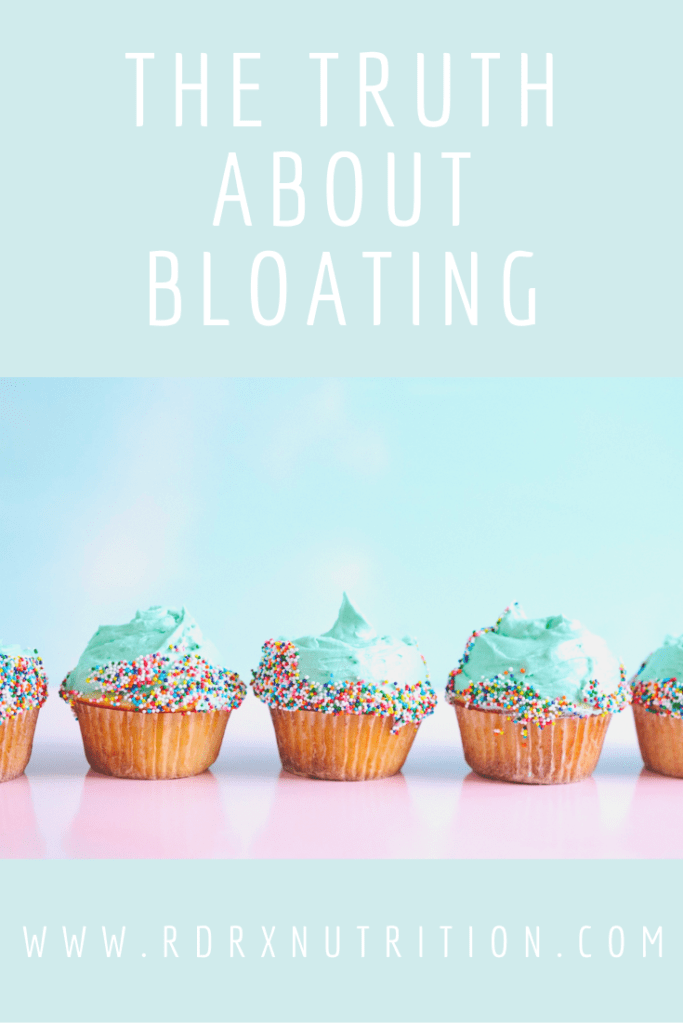How to Reduce Bloating Symptoms
Tired of feeling bloated and uncomfortable? It may be time to asses your diet. Here are some tips on how to reduce bloating.
Do you ever struggle with feeling bloated, gassy, or have stomach discomfort? First of all, it’s okay to pass a little gas, that’s normal and what you ate may be responsible but let’s look at other factors before we go on a crazy elimination diet. Looking at the whole picture vs. strict diet changes right from the get go may be helpful. Sometimes a simple behavior change such as checking in with yourself while eating and slowing down can be very powerful.
Ask yourself…
Have you been exercising?
Have you been eating out more often (higher sodium, high carb/fat and bigger portions)?
Have you been on antibiotics or started taking a new medication recently?
Are you dealing with stress and anxiety?
Eating fast because you’re busy?
Chewing gum or artificial sweeteners?
![]()
Environmental factors that can be responsible for bloating.
Exercise
Exercise such as walking, yoga or jogging can help stimulate the passage of gas through your digestive tract and keep your bowels moving. Try to make a habit of a light walk or stretch session after meals vs. sitting down or going to sleep. Lack of physical activity has also been linked to constipation.
Salt, Bubbles, Large portions
Excessive salty foods, carbonated beverages, or high carb, fat and calorie dishes could be causing some of your stomach symptoms. Sodium binds to water in the body and helps maintain the balance of fluids both inside and outside of cells. If you often eat meals that are high in salt, such as many processed foods or takeout, your body may retain water. Carbonated drinks can cause a buildup of air that can move down the digestive tract and into the colon, causing bloating and gas. Reassess before chugging the trendy bubbly waters. Fatty foods are absorbed slower, so when over loading your stomach with French fries, a heavy milkshake and fried chicken, be prepared to experience a little discomfort. Carbs can do the same thing if it’s more fiber than you are used to or if you have any intolerance to things like gluten, lactose or FODMAPS.
Eating smaller portions simply can reduce sensitivity to the amount of food in your stomach. Try portioning foods with smaller or preportioned Tupperware, tuning into your hunger and fullness cues and assessing how your body feels throughout your meal.
Higher volumes of food, can mean swallowing more air. Slow down, chew your food and reducing portions can be helpful.
Gut Health
Stomach bacteria imbalances from antibiotics can be a cause of bloating along with other medications such as birth control, steroids, and pain meds. Always read your medication labels and speak to your provider about abnormal side effects.
Mood and Mental Health
Anxiety, depression and stress can worsen symptoms of abdominal cramps and pain and make you feel crummy. These mental stressors may coexist with or aggravate disturbances such as the irritable bowel syndrome or functional dyspepsia.
Artificial Sugar
Sugar alcohols and artificial sugars are resistant to digestion. It depends on the individual but gas, bloating and diarrhea are known side effects.
Hormones
Your time of the month can impact bloating due to change in estrogen and progesterone. Some women experience water retention and gastrointestinal distress as PMS symptoms.
Tips on How to Reduce Bloating:
- Swap out beverages for water
- Try increasing activity, get your body and bowels moving
- Avoid artificial sugars and sugar alcohols
- Assess your fiber, fruit and vegetable intake (start with low glycemic fruits and vegetables low in raffinose)
- Reduce carbohydrates and salty foods
- Eat smaller portions
- Assess food intolerances by keeping a food sensitivity journal and assessing symptoms
Common food intolerances:
Here are some common foods and ingredients to consider:
- Lactose
- Fructose
- Eggs
- Wheat and gluten
- Carbonated Beverages
- Artificial Sweeteners and Sugar Alcohols
- Sodium
- Cruciferous Veggies
- Legumes
Possible Food Remedies To Reduce Bloating:
- Water with Lemon or Cucumber
- Yogurt
- Bananas
- Fennel
- Canned Pumpkin
- Asparagus
- Papaya
- Ginger
- Chamomile
- Peppermint
Supplements:
- Probiotics (food sources or supplementation)
- Peppermint Oil (diffused, not ingested)
- CBD Oil (mainly observational studies and self-reported outcomes, not quite enough research, always research the quality before buying and talk to your physician)
- Collagen
![]()
Recipe Ideas to Reduce Bloating:
Cucumber Mint Soup
Banana Nut Chia Seed Yogurt
Roasted Fennel
Fennel Soup
Pumpkin Soup
Pumpkin Yogurt
Roasted Asparagus
Peppermint Ginger Tea
Cucumber Papaya Salad
Cucumber Mint Water
Mashed Sweet Potatoes
Chamomile or Peppermint Tea


